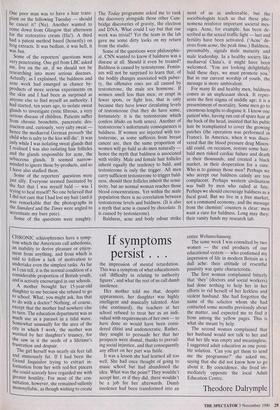If symptoms
persist . .
CHRONIC schizophrenics have a symp- tom which the Americans call anhedonia, an inability to derive pleasure or enjoy- ment from anything, and from which is said to follow a lack of motivation to undertake even the simplest tasks. As far as I can tell, it is the normal condition of a considerable proportion of British youth, and is actively encouraged in our schools. A mother brought her 15-year-old daughter to me because she refused to go to school. What, you might ask, has that to do with a doctor? Nothing, of course, except that the mother had nowhere else to turn. The education department was as much use as a parasol in a tidal wave. Somewhat unusually for the area of the city in which I work, the mother was worried by her daughter's truancy, for she saw in it the seeds of a lifetime's frustration and despair. The girl herself was nearly six feet tall and immensely fat. If I had been the Grand Inquisitor trying to extract in- formation from her with red-hot pincers she could scarcely have regarded me with greater hostility. For most of the con- sultation, however, she remained sullenly monosyllabic, as though wishing to create the impression of mental retardation. This was a symptom of what educationists call 'difficulty in relating to authority figures', and what the rest of us call dumb insolence.
Her mother told me that, despite appearances, her daughter was highly intelligent and musically talented. Alas (she continued), the teachers at her school refused to treat her as an indi- vidual with requirements of her own — to have done so would have been consi- dered elitist and undemocratic. Rather, they sought to persuade her that her prospects were dismal, thanks to prevail- ing social injustice, and that consequently any effort on her part was futile.
It was a lesson she had learned all too well. She had once thought of going to music school but had abandoned the idea. What was the point? They wouldn't accept her, or if they did, there wouldn't be a job for her afterwards. Dumb insolence had been transformed into an
entire Weltanschauung.
The same week I was consulted by two women — the end products of our educational system — who confirmed my impression of life in modern Britain as a dull ache: their attitude of resentful passivity was quite characteristic.
The first woman complained bitterly that 'they' (doctors and social workers) had done nothing to help her in her efforts to rid herself of her feckless and violent husband. She had forgotten the name of the solicitor whom she had contacted some months previously about the matter, and expected me to find it from among the yellow pages. This is what she meant by help.
The second woman complained that her husband would not talk to her and that her life was empty and meaningless. I suggested adult education as one possi- ble solution. 'Can you get them to send me the programme?' she asked me, saying that she did not know how to go about it. By coincidence, she lived im- mediately opposite the local Adult Education Centre.
Theodore Dalrymple


































































 Previous page
Previous page